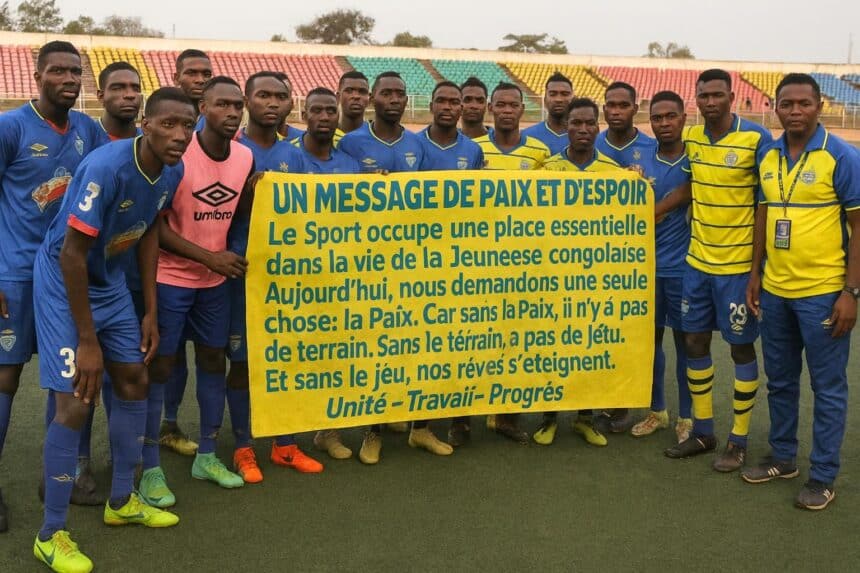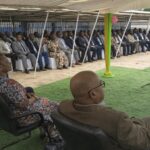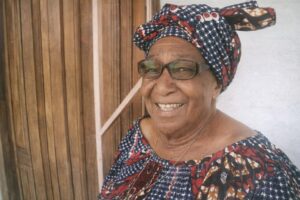AS Otohô secure third CAF group ticket
The floodlights of Stade Président Alphonse-Massamba-Débat still glowed as Brazzaville celebrated a familiar feat: AS Otohô securing a third passage to the CAF Confederation Cup group stage after a composed 2-0 victory over Ferroviário de Maputo on Sunday 26 October 2025.
In Maputo a week earlier, the Congolese champions had already set the tone by snatching a 1-0 away win, planting seeds of confidence that blossomed under home cheers.
Defensive Heroes Decide the Night
Right-back Prince Moundza-Mapata broke the deadlock from the spot in first-half stoppage time, sending goalkeeper Kimissene the wrong way and igniting the Malebo Pool stands.
Minutes after the restart, left-back Charles Atipo galloped down the flank, exchanged a quick pass with striker Barel Mouko, and drilled a low shot inside the far post, sealing a scoreline that Maputo never seriously threatened to overturn.
Coach Arsène Ngoma applauded the discipline of his back-line turned goal-scorers, saying the evening proved ‘every player wears two jerseys: one for defending the badge, another for pushing it forward.’
The opening half-hour had been tense, with Maputo’s Pedro Amadu rattling the crossbar from distance, a scare that goalkeeper Pavel Obassa later described as ‘the slap we needed to wake up’, before Otohô gradually confiscated possession.
Statisticians from the local sports academy counted seven clear chances for the home side, proof that the two goals reflected dominance rather than fortune.
Domestic League Standstill Raises Concerns
Yet triumph on the continent does not dispel the domestic fog: the national Ligue 1 remains paused, despite an initial promise to restart in September.
With no competitive fixtures, Otohô’s match legs risk stiffening before the group stage kicks off on 21 November, only weeks after the draw scheduled for 3 November.
Fitness coach Jean-Francis Mavoungou warns that ‘training sessions are the skeleton; league matches add the muscle. Without both, the body of a team stays fragile when continental giants arrive.’
The pause of Ligue 1 is linked to ongoing renovations in several provincial venues and budgetary adjustments, according to federation spokesperson Rodrigue Mbemba, who believes negotiations with stadium contractors are ‘in the final straight’.
Clubs and supporters nevertheless fear further delays, recalling that the previous season started three months late, compressing fixtures and stretching travel budgets in a country where road distances remain daunting.
Tight Calendar and Innovative Prep
CAF’s congested timetable offers Otohô little breathing room: only twenty-six days separate Sunday’s final whistle from the first group game, a span usually filled by at least four domestic rounds.
Medical staff have already planned alternating morning gym work with late-afternoon friendlies against military and university selections, hoping to simulate match stress without overloading hamstrings.
Otohô’s technical team plans to bus the squad to Oyo for a five-day altitude micro-cycle, mirroring conditions in North Africa where many group opponents traditionally play, a strategy sports scientist Laure Bissila calls ‘gains from oxygen debt’.
Friendly matches are pencilled against AS BNG and Diables Noirs, provided administrative green lights arrive in time; both clubs welcome the idea as a chance to shake rust and gauge new recruits.
Fans and Businesses Rally Behind the Team
Supporters’ groups, buoyed by Sunday’s win, are urging sports administrators to unlock stadium gates and resume Ligue 1, arguing that the national interest now aligns perfectly with continental ambition.
Economist-turned-fan Sorel Bemba notes that ‘each postponed match means vendors stay home, taxis lose fares, and cameramen record silence; restarting the league is not only football, it is livelihoods.’
Ticket prices for Sunday’s tie remained at 1 000 FCFA, a decision praised by student unions who had campaigned for affordability; the federation reported a sell-out of 32 000 seats, generating a colourful mosaic of flags and vuvuzelas.
Local businesses around the stadium extended opening hours, with food vendor Mama Likouala estimating her grilled chicken sales doubled compared with an ordinary weekend market.
Looking Ahead to the Draw
For now, players keep glancing at two calendars pinned inside the locker room: one lists potential heavyweights like Zanaco and Pyramids, the other marks every remaining training day.
Captain Chancel N’tolo insists the mood is calm, explaining that experience from two previous group appearances has taught the squad to ‘respect the schedule we own, not the one we can’t control.’
Otohô return to training Tuesday at 8 am sharp, buoyed by victory yet aware that the next story will be written, minute after minute, on the practice grass.
National Symbol of Resilience
Beyond Oyo, beyond Brazzaville, the qualification lifts national morale, offering young talents an example of perseverance despite logistical headwinds.
Sports Ministry officials present in the VIP box reiterated their commitment to ‘provide the necessary framework so that Congolese football continues shining in regional arenas,’ a pledge warmly applauded by fans craving regular domestic action.
As the team bus rolled out, horns echoed across Avenue de la Paix, reminding everyone that while the path ahead is narrow, the roar behind AS Otohô is broad, unified, and ready for the next whistle.






















